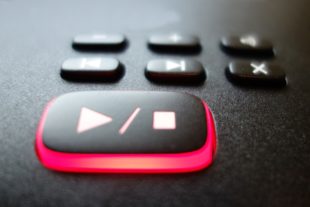 Remember the days of finding out someone was trying to reach you when you got home because there was a blinking light on your answering machine?
Remember the days of finding out someone was trying to reach you when you got home because there was a blinking light on your answering machine?
Today, we are subject to a constant barrage of dings, beeps and notifications via social media apps and instantaneous electronic communications that follow us wherever we go, anytime of the day or night.
How many stories have you heard about people dropping their cell phones in the toilet? (This happened to me last year, perhaps this is a thinly-veiled cry for help). Bottom line is that many of us can’t even go to the bathroom without an electronic device in tow. I’ll let that one settle in for a minute.
While technology has enabled us to become more efficient and effective in our ever-converging personal and work lives, there is a tipping point for us in terms of stores of energy we can expend before needing to recharge. As human beings with limited capacities to multi-task, technology is far outpacing our evolutionary capacity.
The typical answer? Figure out a way to manage the stress while in a constant battle over time and resources in a world where we are trying to do more and more with less and less. So, while the endeavor of stress management is a positive step, it is a reactive one. It elicits a sense of being in the backseat, with a smorgasbord of ‘stressors’ coming at us from various sources (internally and externally), with the defeatist sense that all we can do is try to manage through it.
What would it look like if we shifted our intention to a more proactive, driver’s seat perspective? What if instead of managing the stress coming at us, we first focus on managing our own energy so that we are in the best position possible, emotionally, physically and mentally, to handle anything that comes our way?
In the HBR article “Manage Your Energy, Not Your Time”, Tony Schwartz and Catherine McCarthy of The Energy Project discuss four aspects of personal energy: physical, emotional, mental and spiritual. Here are examples of some small shifts that can help us bring our best selves into our work and home lives:
- Get to bed earlier and reduce consumption of alcohol.
- Get those endorphins going! Exercise a few times a week.
- Take short breaks every 1.5-2 hours. Get up from your desk, move around, and focus on something non-work related for a few minutes to help your brain recharge and reset.
- Evoke positive energy by making a point to express your appreciation to others on a regular basis.
- Put your phone on “do not disturb” while working on tasks that require a high level of focus. It can take up to 45 minutes to get back into the “flow” after an interruption.
- Check and respond to voicemail and e-mails at specified times throughout the day. 9 times out of 10, it really CAN wait.
- Practice deep breathing when you feel negative emotions and before you respond to a difficult situation.
For organizations and managers, there are some things that you can do to support your teams’ efforts in managing their energy. First, give implicit permission to your employees by modeling the desired behavior. A few other ideas:
- Ask your teams to leave their phones at their desk during meetings. This will reduce distractions and increase individual presence, resulting in more effective meetings.
- Subsidize gym memberships or move into a building with a gym.
- Provide quiet, device-free spaces throughout your workplace for people to rest and recharge throughout the day.
- Require employees to take their vacation time, and ensure them that you and others on your team have their back while they are away.
How do you manage your energy? Please share your ideas in the comments section.
-Amy Hill, Teams InBalance Director & Facilitator
Schwartz, T. & McCarthy, C. (2007). Manage your energy, not your time. Harvard Business Review, October. Retrieved from https://hbr.org/2007/10/manage-your-energy-not-your-time
